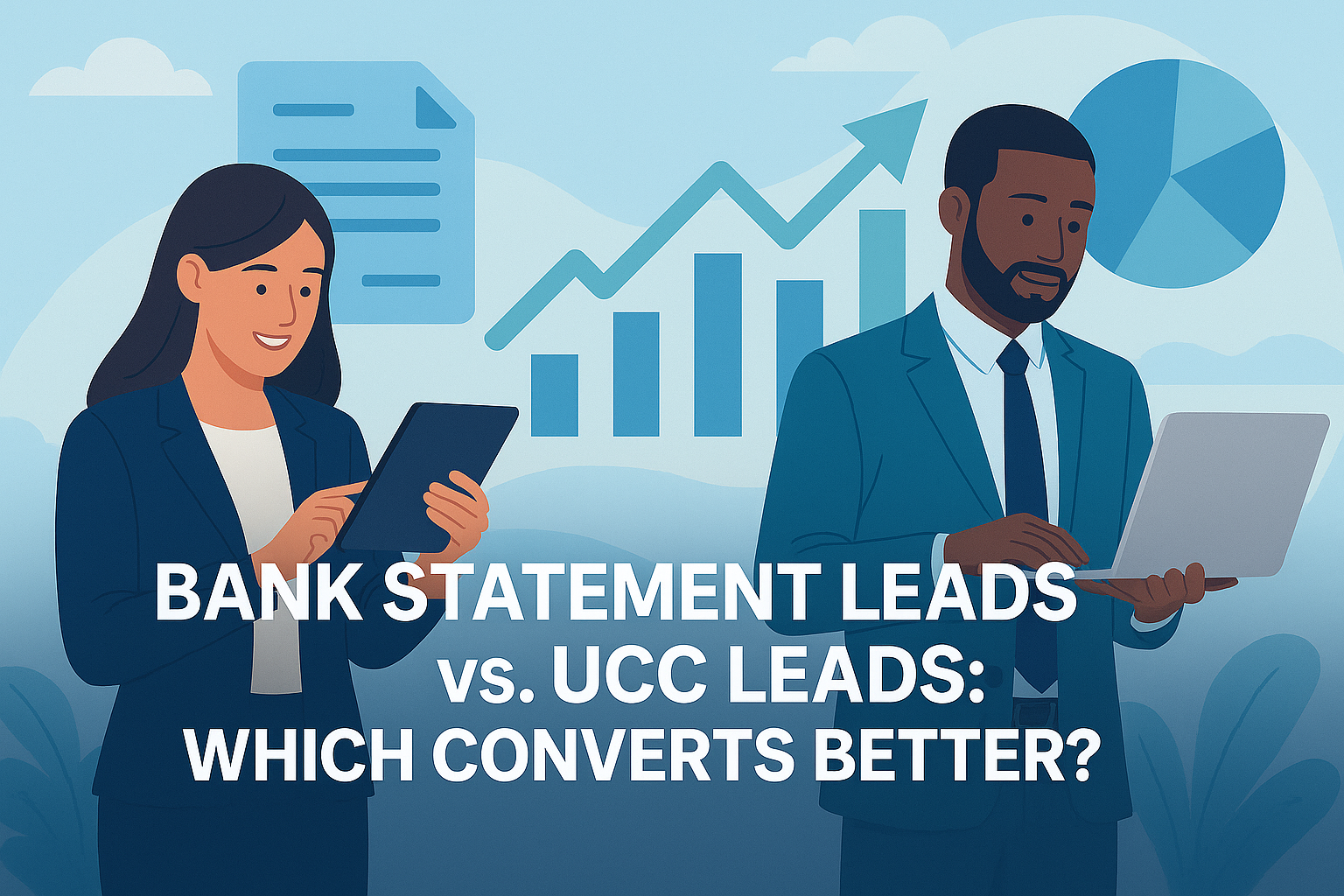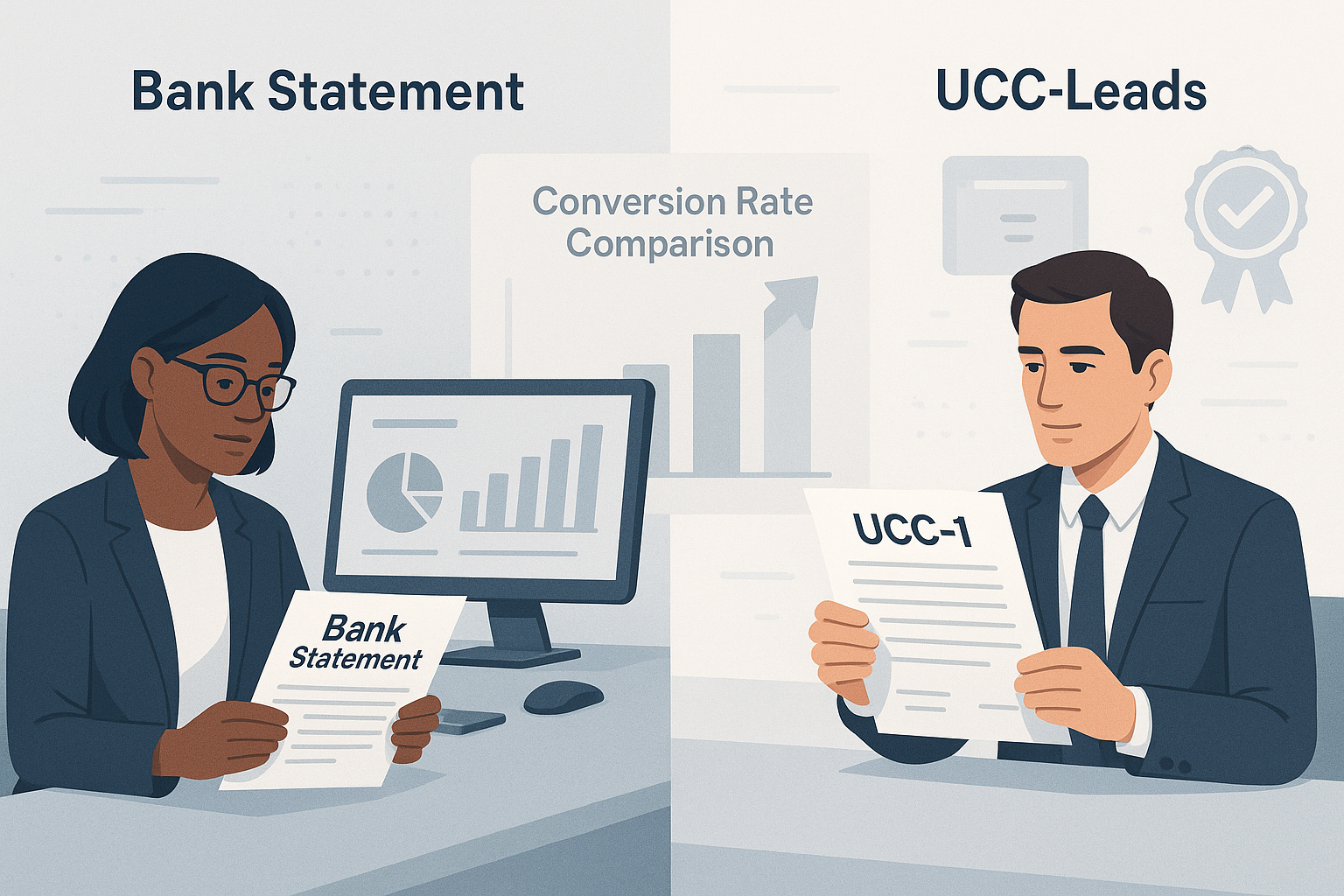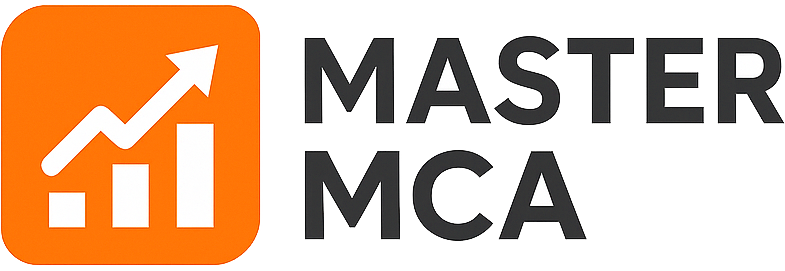
The Ultimate Guide to MCA Leads in 2025
Discover the most effective strategies for generating, qualifying, and converting high-quality merchant cash advance leads in today's competitive market.
What You'll Learn in This Guide
- The current state of the MCA industry in 2025 and projected growth
- The most effective types of MCA leads and their conversion rates
- How to evaluate lead quality and maximize ROI
- Innovative strategies for generating and converting MCA leads
- Technology trends reshaping MCA lead generation
- Compliance considerations for MCA marketing in 2025
Table of Contents
- Introduction
- The MCA Industry in 2025
- Types of MCA Leads in 2025
- Lead Quality Factors
- Innovative Lead Generation Strategies
- Qualifying and Converting MCA Leads
- Technology and MCA Lead Generation
- Compliance and Regulations
- Cost Analysis and ROI
- Future Trends in MCA Lead Generation
- Conclusion
- Frequently Asked Questions
Introduction
The merchant cash advance (MCA) industry continues to evolve rapidly in 2025, with market projections indicating sustained growth and increasing competition. As traditional banks maintain strict lending criteria, small and medium-sized businesses increasingly turn to alternative funding sources like merchant cash advances to meet their working capital needs.
For MCA providers, the challenge isn't just finding businesses in need of capital—it's identifying qualified prospects who represent genuine opportunities for funding. This comprehensive guide explores the latest trends, strategies, and best practices for generating high-quality MCA leads in 2025, helping providers optimize their acquisition efforts and maximize return on investment.
Whether you're an established MCA provider looking to refine your lead generation strategy or a newcomer seeking to understand the landscape, this guide provides actionable insights to help you succeed in the competitive merchant cash advance market of 2025.
The MCA Industry in 2025
In 2025, the merchant cash advance industry is experiencing unprecedented growth, with a projected market size of $19.73 billion—a 15% increase from 2024. This expansion is driven by several key factors:

MCA Market Growth from 2020-2025 (Source: Alternative Lending Association)
Key Industry Trends in 2025
- Increased Demand: Post-pandemic economic recovery has fueled business expansion, creating higher demand for working capital solutions.
- Technology Integration: AI and machine learning are revolutionizing lead generation, qualification, and conversion processes.
- Market Consolidation: Larger players are acquiring smaller MCA providers, creating a more competitive landscape for quality leads.
- Regulatory Evolution: New compliance requirements are reshaping marketing and sales practices within the industry.
- Specialization: MCA providers are increasingly focusing on specific industries or business types, requiring more targeted lead generation.
Companies like Credibly, Libertas Funding, and Lendio remain industry leaders, but the market has seen an influx of new providers competing for the same pool of qualified businesses. This competitive environment makes effective lead generation more crucial than ever for MCA providers looking to maintain or grow their market share.
Industry Insight: In 2025, the average merchant cash advance amount has increased to $65,000, up from $52,000 in 2023, reflecting businesses' growing capital needs and lenders' increased confidence in the alternative funding model.
Types of MCA Leads in 2025
The quality and source of merchant cash advance leads significantly impact conversion rates and return on investment. In 2025, MCA providers have access to several distinct lead types, each with unique advantages and considerations:
UCC Leads
Uniform Commercial Code (UCC) filings remain the gold standard for MCA lead generation in 2025. These leads target businesses that have previously received funding, demonstrating both a willingness to use alternative financing and an ability to make payments.
Advantages
- Pre-qualified businesses with proven funding history
- Higher conversion rates (3-5% industry average)
- Detailed business information available
- Businesses familiar with alternative funding concepts
Considerations
- Higher cost per lead ($30-75)
- Competitive targeting from multiple MCA providers
- Varying quality based on filing age
- Requires effective stacking strategies
In 2025, the most effective UCC leads are those from filings less than 6-12 months old, with businesses that have completed at least 50% of their previous funding term. These businesses are often prime candidates for renewal or additional funding.
Bank Statement Leads
Bank statement leads have emerged as a premium lead source in 2025, consisting of businesses that have submitted their financial information specifically for funding consideration. These leads demonstrate high intent and provide valuable insight into a business's financial health.
Advantages
- High intent prospects actively seeking funding
- Pre-verified financial information
- Superior conversion rates (5-8%)
- Detailed cash flow data for qualification
Considerations
- Premium pricing ($100-200 per lead)
- Limited availability compared to other lead types
- Requires rapid response (often shopping multiple providers)
- Varying quality across lead generators
The 2025 market has seen increased competition for exclusive bank statement leads, with top providers offering guaranteed funding-ready prospects. These leads typically require immediate follow-up, as businesses submitting bank statements are often in active discussions with multiple funding sources.
Credit Inquiry Triggers
Credit inquiry trigger leads identify businesses that have recently applied for financing through credit bureau inquiries. These business funding leads capture businesses at the exact moment they're seeking capital, often before they've secured funding.
Advantages
- Real-time funding intent
- Businesses actively seeking capital
- Often less competitive than UCC leads
- Opportunity to be first-to-market
Considerations
- Moderate conversion rates (2-4%)
- Limited financial pre-qualification
- Requires extremely fast response time
- May include businesses rejected by traditional lenders
In 2025, advanced trigger systems can now differentiate between various types of credit inquiries, allowing MCA providers to target businesses specifically seeking working capital rather than other credit products. This refinement has improved the quality and conversion rates of trigger leads.
Aged MCA Payoff Lists
Aged payoff lists consist of businesses that have successfully completed merchant cash advance terms. These qualified MCA leads represent businesses with proven performance and established cash flow.
Advantages
- Proven repayment history
- Businesses familiar with MCA products
- Lower risk profile
- Good conversion rates (4-6%)
Considerations
- Moderate to high cost ($40-90 per lead)
- May already be satisfied with previous provider
- Varying data freshness
- Requires compelling offers to switch providers
The 2025 market has seen increased sophistication in aged payoff list segmentation, with providers now able to target businesses based on specific performance metrics, industry types, and funding amounts. This targeted approach has improved conversion rates for these historically valuable leads.
Live Transfer Leads
Live transfer leads represent the premium tier of MCA leads in 2025, consisting of pre-qualified businesses that are transferred directly to funding specialists in real-time. These leads combine high intent with immediate availability.
Advantages
- Highest conversion rates (8-12%)
- Pre-qualified through initial screening
- Immediate contact with decision-makers
- Reduced sales cycle length
Considerations
- Highest cost ($200-400 per transfer)
- Requires available funding specialists
- Quality varies by lead generation partner
- Limited volume availability
In 2025, advanced live transfer programs now include pre-transfer qualification data, allowing funding specialists to prepare personalized offers before speaking with prospects. This preparation has further improved conversion rates and customer experience.

Comparison of MCA Lead Types by Cost and Conversion Rate (2025 Data)
Lead Quality Factors
Not all merchant cash advance leads are created equal. In 2025, successful MCA providers evaluate lead quality based on several critical factors:
Business Age and Stability
Businesses with at least 6-12 months of operating history demonstrate stability and provide sufficient data for risk assessment. In 2025, the sweet spot for MCA qualification is businesses with 2-5 years of history, balancing established operations with ongoing capital needs.
Monthly Revenue
The industry standard in 2025 requires businesses to generate at least $10,000 in monthly revenue, with preferred candidates showing $15,000-$50,000. Higher revenue businesses typically qualify for larger advances and represent better conversion opportunities.
Cash Flow Consistency
Businesses with consistent daily or weekly revenue patterns present lower risk profiles. The 2025 market increasingly values cash flow stability over gross revenue, with advanced analytics now able to evaluate seasonal patterns and growth trajectories.
Industry Type
Certain industries continue to perform better for MCA funding in 2025, including restaurants, retail, construction, transportation, and healthcare services. Industry-specific conversion rates now factor heavily into lead pricing and targeting strategies.
Credit Profile
While MCAs are more flexible than traditional loans, business owner credit still matters. In 2025, most providers require minimum FICO scores of 500-550, with tiered pricing and terms based on credit quality. Leads with verified credit data command premium prices.
Funding Purpose
Businesses seeking capital for expansion, inventory, or equipment typically represent higher quality leads than those needing emergency funding. In 2025, lead generation systems increasingly capture and qualify funding purpose data to improve conversion probability.
Data Freshness
Lead age significantly impacts conversion rates. In the fast-paced 2025 market, leads older than 30 days show dramatically reduced conversion potential, with optimal response rates for leads less than 72 hours old.
Expert Tip: In 2025, the most successful MCA providers use weighted scoring models that evaluate multiple quality factors simultaneously, allowing for more nuanced lead prioritization and improved conversion rates.

Download Our MCA Lead Quality Checklist
Get our comprehensive checklist for evaluating MCA lead quality and maximizing conversion rates.
Download Free ChecklistInnovative Lead Generation Strategies
The competitive landscape of MCA leads in 2025 has driven providers to develop innovative approaches to lead generation and qualification:
Predictive Analytics and Intent Data
Advanced AI systems now analyze thousands of data points to identify businesses likely to need funding before they actively seek it. These systems monitor business growth patterns, seasonal trends, inventory levels, and even social media sentiment to predict funding needs with remarkable accuracy.
In 2025, leading MCA providers use predictive models that can identify potential funding needs 30-60 days before businesses begin actively searching for capital, creating opportunities for proactive outreach and relationship building.
Industry-Specific Targeting
Rather than pursuing general business funding leads, successful providers in 2025 are developing deep expertise in specific industries. This specialized approach allows for more relevant messaging, appropriate funding structures, and higher conversion rates.
For example, MCA providers focusing on restaurant funding now offer specialized products aligned with seasonal patterns, equipment needs, and expansion opportunities specific to food service businesses. This targeted approach has increased conversion rates by 25-40% compared to generic funding offers.
Strategic Partnerships
In 2025, innovative MCA providers are forming strategic partnerships with business service providers, industry associations, and technology platforms that serve their target markets. These partnerships create warm lead channels with built-in credibility.
Point-of-sale system providers, accounting software companies, and industry-specific service platforms have become valuable lead sources, offering integration points that identify funding needs based on actual business performance data.
Content Marketing and SEO
Educational content continues to be a powerful lead generation tool in 2025, with businesses researching funding options more thoroughly than ever. MCA providers creating high-value, industry-specific content are capturing organic search traffic and establishing thought leadership.
The most effective content strategies focus on solving specific business challenges rather than promoting funding products directly. This approach attracts businesses at earlier stages of the funding consideration process, allowing for relationship development before urgent capital needs arise.
Referral Programs
Structured referral programs have evolved significantly in 2025, with tiered rewards, automated tracking, and specialized training for referral partners. These programs now generate 15-25% of new business for leading MCA providers.
The most successful referral programs focus on business service providers who regularly encounter clients with working capital needs, including accountants, business consultants, equipment vendors, and industry-specific service providers.
Retargeting and Nurture Campaigns
Advanced retargeting systems now track business funding intent across multiple channels, delivering personalized messaging based on specific indicators of interest. These systems maintain engagement with prospects who aren't immediately ready for funding.
In 2025, the most sophisticated nurture campaigns combine automated touchpoints with strategic human interaction, maintaining relationships with prospects for 6-12 months before conversion. This long-term approach has proven particularly effective for higher-quality, established businesses.

Effectiveness of Various MCA Lead Generation Strategies in 2025
Qualifying and Converting MCA Leads
Generating qualified MCA leads is only the first step. In 2025, the most successful providers excel at qualifying and converting these leads through systematic processes:
Speed-to-Contact
In the competitive 2025 market, response time is more critical than ever. Research shows that contacting leads within 5 minutes increases conversion probability by 400% compared to waiting 30+ minutes.
Leading MCA providers now employ automated initial response systems that engage prospects immediately, followed by rapid human contact. These systems maintain engagement until a funding specialist can provide personalized attention.
2025 Response Time Benchmarks
- Elite performance: Initial contact within 2 minutes, detailed follow-up within 15 minutes
- Industry average: Initial contact within 15 minutes, detailed follow-up within 1 hour
- Minimum standard: Initial contact within 1 hour, detailed follow-up within 4 hours
Multi-Channel Engagement
The 2025 approach to lead conversion leverages multiple communication channels simultaneously, recognizing that different business owners have different communication preferences.
Successful providers coordinate outreach across phone, email, SMS, and business messaging platforms, creating multiple opportunities for engagement without appearing intrusive. This coordinated approach has shown to increase contact rates by 30-40% compared to single-channel strategies.
Qualification Frameworks
Structured qualification frameworks help funding specialists quickly assess lead quality and determine appropriate next steps. In 2025, these frameworks typically evaluate:
Business Qualification
- Time in business (minimum 6 months)
- Monthly revenue (minimum $10,000)
- Industry type and business model
- Current cash flow and stability
- Existing funding obligations
Owner Qualification
- Credit score (minimum 500-550)
- Decision-making authority
- Funding timeline and urgency
- Specific use of funds
- Previous funding experience
Personalized Funding Solutions
Generic funding offers have become ineffective in 2025. The most successful MCA providers now tailor their proposals to each business's specific situation, considering:
- Seasonal cash flow patterns
- Industry-specific funding needs
- Growth stage and trajectory
- Specific use of funds
- Previous funding history
This personalized approach has shown to increase conversion rates by 35-50% compared to standardized funding offers, particularly for higher-quality businesses with multiple funding options.
Objection Handling
In 2025, successful MCA providers train their funding specialists to address common objections with data-driven responses. The most frequent objections include:
- Cost concerns (factor rates and total payback)
- Daily/weekly payment impact on cash flow
- Comparison with traditional loan products
- Concerns about funding speed and documentation
- Questions about prepayment options
Advanced training programs now include scenario-based practice and real-time coaching tools that suggest responses based on conversation analysis.
Streamlined Application Process
The 2025 standard for MCA applications emphasizes simplicity and speed. Leading providers have reduced their application processes to essential information only, with automated verification systems handling much of the due diligence.
Mobile-optimized applications, electronic signature capabilities, and secure document upload systems have become standard, allowing business owners to complete the entire process from their smartphones in under 15 minutes.
Success Metric: In 2025, top-performing MCA providers achieve application-to-funding conversion rates of 70-80% by combining rapid qualification, personalized offers, and streamlined processes.
Technology and MCA Lead Generation
Technology continues to reshape MCA lead generation in 2025, with several key innovations driving improved efficiency and effectiveness:
AI-Powered Lead Scoring
Artificial intelligence has transformed lead qualification, with advanced systems now able to analyze hundreds of data points to predict funding probability, optimal offer terms, and likely conversion paths.
These systems continuously learn from funding outcomes, refining their algorithms to improve prediction accuracy over time. In 2025, AI-powered lead scoring systems achieve 80-85% accuracy in predicting which leads will convert to funded deals.
Automated Engagement Platforms
Sophisticated engagement platforms now manage multi-channel communication with prospects, delivering personalized content based on business type, funding needs, and engagement patterns.
These platforms coordinate email sequences, SMS messages, social media engagement, and even phone calls, ensuring consistent messaging and optimal timing across all channels. The most advanced systems adjust communication frequency and content based on prospect response patterns.
Data Integration and Enrichment
In 2025, MCA providers leverage multiple data sources to enrich lead information, combining proprietary data with third-party business intelligence, credit information, and industry-specific metrics.
Advanced data integration platforms now provide comprehensive business profiles within seconds, allowing funding specialists to understand a prospect's situation before initial contact. This enriched data enables more relevant conversations and appropriate funding recommendations.
Conversational AI and Chatbots
Intelligent chatbots have evolved significantly in 2025, now capable of handling initial lead qualification, answering complex questions about funding options, and scheduling appointments with funding specialists.
These systems use natural language processing to understand prospect needs and provide relevant information, creating 24/7 engagement opportunities. The most advanced systems seamlessly transition conversations to human specialists when appropriate, maintaining context and conversation history.
Blockchain for Lead Verification
Blockchain technology has emerged as a solution for lead verification and tracking in 2025, creating immutable records of lead source, contact history, and ownership.
This technology has helped address long-standing industry challenges related to lead recycling, unauthorized reselling, and disputed ownership. Blockchain-verified leads now command premium prices due to their guaranteed exclusivity and transparency.
Predictive Analytics
Predictive analytics platforms now forecast funding needs based on business performance data, industry trends, and economic indicators. These systems identify potential leads before they actively seek funding.
In 2025, the most sophisticated predictive systems integrate with business accounting platforms, point-of-sale systems, and inventory management tools to identify capital needs based on actual operational data.

Impact of Technology on MCA Lead Generation and Conversion (2025)
Compliance and Regulations
The regulatory landscape for merchant cash advance leads has evolved significantly in 2025, with increased scrutiny of marketing practices, data handling, and disclosure requirements:
Marketing Compliance
Federal and state regulations now impose stricter requirements on MCA marketing materials, including:
- Clear disclosure of factor rates and total payback amounts
- Prohibition of certain terms that imply traditional loan products
- Restrictions on claims regarding approval rates and funding speed
- Requirements for substantiation of marketing claims
- Specific disclosures for targeted industries
In 2025, leading MCA providers maintain comprehensive compliance review processes for all marketing materials, including third-party lead generation partners.
Data Privacy and Security
Enhanced data privacy regulations now govern the collection, storage, and sharing of business financial information. Key requirements include:
- Explicit consent for data collection and sharing
- Right to access and delete stored business information
- Mandatory data security measures and breach notification
- Restrictions on cross-border data transfers
- Limitations on data retention periods
These regulations have significant implications for lead generation practices, requiring careful attention to consent mechanisms and data handling procedures.
Telemarketing Regulations
Telemarketing remains a key channel for MCA lead generation, but 2025 regulations impose strict requirements:
- Enhanced consent requirements for automated calling systems
- Expanded business-to-business calling restrictions
- Mandatory call recording and retention for verification
- Specific script requirements and prohibited practices
- Enhanced penalties for violations
Successful MCA providers maintain robust compliance systems for telemarketing operations, including call monitoring, script approval processes, and regular training.
Lead Source Verification
Regulatory focus on lead generation practices has increased in 2025, with requirements for:
- Documentation of lead acquisition methods
- Verification of consent for contact
- Transparency in lead transfer and sharing
- Due diligence requirements for lead providers
- Prohibition of certain lead generation tactics
These requirements have driven increased formalization of lead provider relationships, with detailed contracts addressing compliance responsibilities and liability allocation.
Compliance Alert: In 2025, regulatory enforcement actions against non-compliant MCA marketing practices have increased by 65% compared to 2023, with penalties averaging $125,000 per violation. Maintaining robust compliance programs is essential for sustainable lead generation.
Cost Analysis and ROI
Understanding the true cost and return on investment for MCA leads in 2025 requires comprehensive analysis beyond simple cost-per-lead metrics:
Lead Acquisition Costs
The direct cost of acquiring MCA leads varies significantly based on lead type, quality, and exclusivity. In 2025, typical costs include:
| Lead Type | Cost Range (2025) | Average Conversion | Cost Per Funded Deal |
|---|---|---|---|
| UCC Leads | $30-75 per lead | 3-5% | $600-2,500 |
| Bank Statement Leads | $100-200 per lead | 5-8% | $1,250-4,000 |
| Credit Inquiry Triggers | $40-90 per lead | 2-4% | $1,000-4,500 |
| Aged Payoff Lists | $40-90 per lead | 4-6% | $667-2,250 |
| Live Transfer Leads | $200-400 per transfer | 8-12% | $1,667-5,000 |
| Organic/Content Marketing | $75-150 per lead | 3-7% | $1,071-5,000 |
| Referral Partners | $150-300 per lead | 10-15% | $1,000-3,000 |
Total Acquisition Cost Factors
Beyond the direct cost of leads, comprehensive ROI analysis in 2025 considers several additional factors:
Sales and Processing Costs
- Sales team compensation (base + commission)
- CRM and technology platform costs
- Underwriting and verification expenses
- Documentation and closing costs
- Funding coordination expenses
Opportunity Costs
- Time spent on non-converting leads
- Capital allocation during processing
- Alternative lead source potential
- Delayed funding impacts
- Team capacity limitations
ROI Calculation Framework
In 2025, sophisticated MCA providers use comprehensive ROI frameworks that consider multiple factors:
ROI Formula Components
- Total Revenue: Factor rate × Advance amount (average $65,000 in 2025)
- Cost of Capital: Funding amount + Capital costs during term
- Acquisition Costs: Lead cost + Sales cost + Processing cost
- Servicing Costs: Payment processing + Customer service + Collections
- Risk Adjustment: Expected default rate × Average loss severity
ROI = (Total Revenue - Cost of Capital - Acquisition Costs - Servicing Costs - Risk Adjustment) / (Acquisition Costs + Cost of Capital)
Lifetime Value Considerations
The most sophisticated MCA providers in 2025 look beyond single-transaction ROI to evaluate the lifetime value (LTV) of acquired leads:
- Average number of repeat fundings per client (2.7 in 2025)
- Increasing advance amounts for repeat clients (typically 20-30% higher)
- Reduced acquisition costs for renewals and repeat business
- Lower default rates among established clients
- Referral value from satisfied clients
This LTV perspective often justifies higher initial lead acquisition costs for high-quality prospects with strong renewal potential.
Future Trends in MCA Lead Generation
Looking beyond 2025, several emerging trends will shape the future of merchant cash advance lead generation:
Embedded Finance Integration
The next frontier in MCA lead generation involves deeper integration with business operating systems. Rather than pursuing businesses through traditional marketing channels, funding will be offered at the point of need within business management platforms.
Accounting software, inventory management systems, and e-commerce platforms will incorporate funding options directly into their interfaces, identifying capital needs based on real-time business data and presenting MCA offers at the optimal moment.
Hyper-Personalized Funding Solutions
The future of MCA will move beyond standardized products to highly customized funding solutions tailored to specific business types, cash flow patterns, and growth stages. This evolution will require more sophisticated lead qualification and matching systems.
Leading providers will develop industry-specific funding products with unique structures, repayment terms, and qualification criteria, requiring more precise lead targeting and qualification.
Predictive Funding
Advanced AI systems will increasingly predict business funding needs before owners recognize them themselves. These systems will analyze thousands of data points to identify capital requirements related to growth opportunities, seasonal patterns, and market shifts.
This predictive approach will transform lead generation from a reactive process to a proactive one, with MCA providers initiating conversations about specific funding needs at precisely the right moment.
Blockchain-Based Lead Marketplaces
Distributed ledger technology will create more transparent, efficient marketplaces for MCA leads, addressing long-standing industry challenges related to lead quality, exclusivity, and pricing.
These platforms will provide immutable records of lead source, contact history, and ownership, reducing disputes and creating more efficient markets for high-quality leads. Smart contracts will automate lead delivery, verification, and payment processes.
Regulatory Evolution
The regulatory landscape for MCA marketing and lead generation will continue to evolve, with increased focus on transparency, data privacy, and consumer protection. These changes will require more sophisticated compliance systems and documentation.
Forward-thinking MCA providers are already investing in adaptable compliance frameworks that can quickly incorporate new requirements and maintain detailed records of marketing practices and lead acquisition methods.
Conclusion
As we navigate 2025, the landscape for merchant cash advance leads continues to evolve rapidly. Success in this competitive market requires a multi-faceted approach that combines proven lead sources like UCC filings and bank statement applications with cutting-edge digital strategies and sophisticated conversion techniques.
The most successful MCA providers will be those who not only generate a high volume of leads but also implement efficient qualification processes, responsive sales protocols, and data-driven optimization. With the right approach to MCA lead generation, your funding company can achieve sustainable growth while providing valuable capital solutions to businesses in need.
Remember that in the alternative business funding space, building trust is paramount. Ethical lead generation practices and transparent funding terms will not only keep you compliant but also help you build a reputation that drives referrals and repeat business—often the most valuable leads of all.
By staying informed about industry trends, embracing technological innovations, and maintaining a relentless focus on lead quality and conversion, MCA providers can thrive in the dynamic and growing market of 2025 and beyond.
Frequently Asked Questions
What are MCA leads?
MCA leads are potential clients for merchant cash advance providers. These are typically small to medium-sized businesses seeking working capital through alternative funding solutions. Quality MCA leads include businesses with consistent cash flow, at least 6 months in operation, and minimum monthly revenue requirements (typically $10,000+).
What is the average cost of MCA leads in 2025?
In 2025, the cost of MCA leads varies based on quality and source. UCC leads typically range from $30-$75 per lead, while exclusive bank statement leads can cost $100-$200 each. Live transfer leads are the most expensive, ranging from $200-$400 per qualified transfer. The industry average for quality MCA leads is approximately $50-$100 per lead in 2025.
How can I verify the quality of MCA leads?
To verify MCA lead quality, establish clear criteria including: minimum time in business (6+ months), minimum monthly revenue ($10,000+), business owner credit score (500+), and industry type. Request sample leads before large purchases, verify data freshness (leads should be less than 30 days old), and track conversion metrics. Working with reputable lead providers who offer guarantees or replacement policies is also recommended.
Are UCC leads still effective for MCA in 2025?
Yes, UCC leads remain highly effective for MCA providers in 2025. These leads target businesses that have already received funding and demonstrated ability to make payments. The 2025 market shows UCC leads converting at 3-5% on average, higher than most other lead types. For best results, focus on UCC-1 filings less than 6-12 months old and implement a multi-touch contact strategy.
What are the best industries for MCA leads in 2025?
The most responsive industries for MCA leads in 2025 include: restaurants and food service (particularly quick-service restaurants), retail businesses, construction companies, transportation and logistics firms, healthcare practices, professional services, and e-commerce businesses. Industries with consistent cash flow, seasonal capital needs, or growth opportunities tend to be the most receptive to merchant cash advance offerings.
How has AI impacted MCA lead generation in 2025?
AI has revolutionized MCA lead generation in 2025 through predictive analytics that identify high-probability prospects, automated lead scoring systems, personalized outreach at scale, and intelligent chatbots for initial qualification. AI tools now analyze cash flow patterns, credit data, and industry trends to predict funding needs before businesses actively seek capital. This has increased conversion rates by 30-40% for providers using advanced AI systems.
What is the typical conversion rate for MCA leads?
In 2025, typical conversion rates for MCA leads vary by source and quality. UCC leads convert at 3-5%, bank statement leads at 5-8%, credit inquiry triggers at 2-4%, and aged payoff lists at 4-6%. Live transfer leads have the highest conversion rates at 8-12%. Overall industry average is approximately 4-6% for quality leads. Conversion rates can be significantly improved with proper lead nurturing, timely follow-up, and personalized funding offers.
How important is speed-to-contact for MCA leads in 2025?
Speed-to-contact is critical for MCA leads in 2025. Research shows that contacting leads within 5 minutes increases conversion probability by 400% compared to waiting 30+ minutes. The competitive MCA market means businesses often submit multiple funding applications simultaneously. First-responders typically win the deal, with conversion rates dropping by approximately 10% for each hour of delay in initial contact.
Related Guides

UCC Filings: The Gold Standard for MCA Lead Generation
Learn why UCC filings remain the most reliable source of high-intent prospects for merchant cash advance providers.

Bank Statement Leads vs. UCC Leads: Which Converts Better?
A comprehensive comparison of two premium lead sources for MCA providers, with data-driven insights on conversion rates and ROI.

The Complete Guide to MCA Sales Conversion
Master the art of converting merchant cash advance leads into funded deals with proven sales strategies and scripts.
Get Premium MCA Leads
Access high-quality merchant cash advance leads that convert. Complete the form below to discuss your lead generation needs.
2025 MCA Lead Generation Playbook
Download our comprehensive guide with actionable strategies to generate high-quality merchant cash advance leads in 2025.
- 10 proven MCA lead generation strategies
- Lead qualification checklists
- ROI calculator templates

